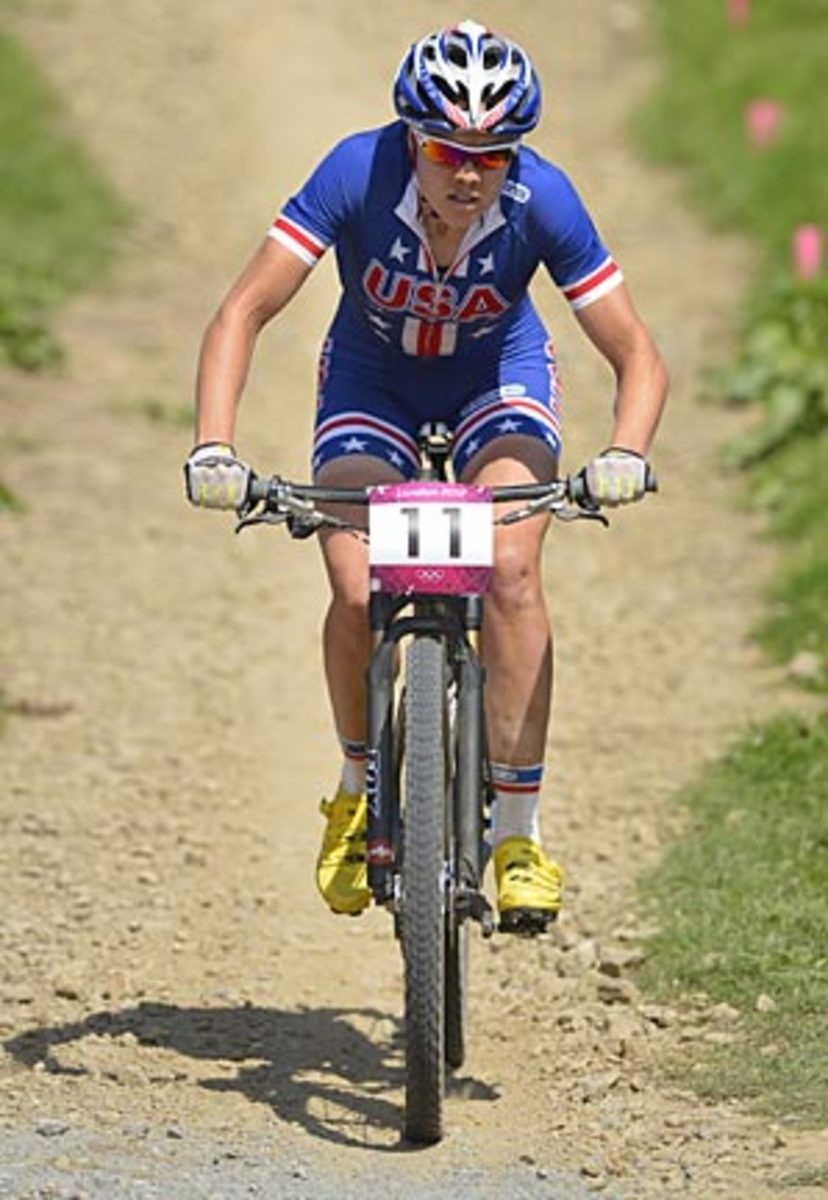
Gould puts U.S. back on Olympic mountain biking medal podium
ESSEX, United Kingdom -- Confessions of sportswriter on Day 15 of the Olympics: the same way we're reaching into the farthest recesses of our hotel room drawers in hopes of finding clean, umm, socks, we're also casting about for different ways to say the same thing. I'm hearing a lot of my colleagues refer to silver and bronze as "lesser medals."
But sometimes bronze is bigger than it seems.
That was the case on this sun splashed day at Hadleigh Farm, an hour's drive east of London, where the best female mountain bikers in the world survived six laps on a devilish, boulder-strewn 4.7-kilometer course overlooking the Thames Estuary and the English Channel beyond. In a bit of karmic payback for recent British cycling triumphs on the Continent, Julie Bresset of France rode away with the gold. Just over a minute later, Germany's Sabine Spitz finished second, the look on her face something between a grin and a rictus, reflecting how deeply she'd suffered to hold off Georgia Gould of Fort Collins, Colorado.
If the wattage of Gould's smile seemed out of proportion to the color of her medal, consider these facts: Since this made-in-the-USA sport joined the Olympics in 1996, only one American has medalled in it. (Susan DeMattei took bronze in Atlanta.)
"The cycling culture is so strong in Europe that they adapted very quickly to mountain biking," says Marc Gullickson, who directs the mountain biking program at USA Cycling. "By the time it became an Olympic sport, we'd lost our grip on it."
With Gould posing for photographers with her bronze medal behind him, he added, "So this feels like a nice shift back."
Gould is a 32-year-old former psychology major and juggler from the University of Montana who rides for the Luna Chix pro team. Her semi-dubious claim to fame coming into these Games was that she was perhaps the strongest rider never to have won a World Cup event. If Gould started feeling a little snakebitten earlier this season, you couldn't blame her. After leading a World Cup race at Mont Sainte Anne in Quebec earlier this summer, she cramped in the second-to-last lap and was passed with half a lap to go.
A week later in Windham, NY, it was Groundhog Day: After leading for most of the race, she flatted a half-lap from the finish, desperately ran her bike toward the line but was passed with 30 meters to go.
At Hadleigh Farm, Gould flipped that script by frontloading her misfortunes. She got off to a less-than-ideal start -- "I sort of picked the wrong side to line up on, I guess, and I sort of went backward" -- and quickly found herself languishing in the back of the pack. The narrow, twisting, technical trails in mountain biking make it much more difficult to overtake riders than in a road race. But Gould was patient, and confident. Yes, she'd had those World Cup victories cruelly snatched away. But she was also fit and strong enough to be in a position to have them cruelly snatched away.
Rattling over such obstacles as Triple Trouble and The Rock Garden, attacking climbs dubbed Snake Hill, and The Breathtaker, she worked her way through the field, picking off a rider here, three there, until she arrived at the front of the race, with Bresset and Spitz, with four laps to go. (Notable by her absence: Bresset's Luna Chix teammate and current world champ, Catharine Pendrel of Canada, who never found her rythym: "I just didn't have it.")
The race was defined by what happened on the next lap. After the French rider nimbly picked her way through a rock-strewn descent, Spitz made a hash of it, taking a bad line, sinking her front wheel between boulders, her rear wheel flying skyward like the hind legs of a bronco. While struggling to remount and clip her pedal back in, she essentially set a pick for Gould, who went quietly nuts waiting for the older woman to either get back on her bike or get the hell out of the way.
During this delay, Brisset opened up a modest gap -- 25 or so seconds -- that the two chasers never could close.
There was your podium. Gould passed the German shortly thereafter, but Spitz got her mojo back, caught the American and passed her. This time, Gould stayed passed.
Bresset finished with enough of a cushion to slow just before the line and grab from a spectator in a French tricoleur -- a stylish conclusion to a sensational race. As Spitz ground up the last climb, Gould gained on her slightly, sending the announcer into a premature paroxysm. The ex-Montana Grizzly wasn't about to catch the savvy, 40-year-old Spitz, who'd done a superb job managing -- no, make that minding -- the gap between her and Gould. But she was putting space between her and Russia's Irina Kalentieva, who lurked a half-minute back.
Gould had spent the final lap waiting for the other shoe to drop. "Just because you've made it up that last hill doesn't mean something can't go wrong in the last minute of the race," she said, a rueful reference to her earlier disappointments. Her eyes watered when she said, "I still can't believe that nothing happened on that last lap."
It didn't and Gould collected an overdue medal with outsized significance, both to her, and to the country that invented mountain biking, and now finds itself back in the game.





